Dzhokhar Tsarnaev, left, and brother Tamerlan are accused of setting off bombs near the finish of the 2013 Boston Marathon.
April 21, 2013
STORY HIGHLIGHTS
- Acquaintances say Tsarnaev brothers were likable, well-loved
- They struggle with allegations that they committed bombings
- If true, one says, "The brain behind this is the older brother"
- An uncle of Tsarnaevs says the older one said God had a plan for him
Cambridge, Mass. (CNN) -- The first image the nation saw of the two brothers may serve as more than a pivotal clue to investigators in the Boston Marathon bombings. It is, perhaps, a snapshot of their relationship: One leads, the other follows.
That's how some friends remember the Tsarnaev brothers: At 26, Tamerlan was seven years older than his brother Dzhokhar, who followed his big brother around like a puppy.
And with their father in Russia, the older brother may have become a father figure to the 19-year-old these past few months. At 6-feet-3, Tamerlan was, by many accounts, an intimidating presence with increasingly strong convictions about society and religion in recent years.
But the picture that is emerging of the now infamous brothers is also fuzzy -- just like the surveillance video.
An investigator who studied their video images after the bombings said the two brothers "acted differently than everyone else" -- they stuck around and watched the carnage unfold, and walked away "pretty casually."
Aquaintances of the brothers, now dredging their memories, find themselves short on clues. Many say both were likable and well-loved in their neighborhood, not loners driven away by society.
The casual air of the brothers seemed to mean nothing before Monday, April 15.
'He was a big friendly giant'
Luis Vasquez had planned to watch the finish of the race with his family, but the hectic pace of raising two young children altered his plans.
Vasquez had been friends with Tamerlan and one of his sisters in high school. They would hang out together at cafes and talk about boxing, Tamerlan's real passion. Vasquez also coached the younger brother in soccer at Cambridge Rindge & Latin School.
Reflecting on what transpired this week, he can't help but think of the what-ifs. What if he had attended the marathon? "I wonder if they had seen us ... if they would say anything to us or if they would've acknowledged us in any way," Vasquez said. "That kills me to know, because we were going to be there."
As the oldest of four, Tamerlan seemed to see it as his duty to make sure his siblings didn't forget their Chechen roots. He was about 16 when the family arrived in America.
One sister had an arranged marriage awaiting her in Chechnya, Vasquez said, and "he felt the responsibility to make sure she stayed in line with that." That sister enjoyed the freedom of America, and Tamerlan had "an issue with that." He was like a shadow, always lurking in her presence.
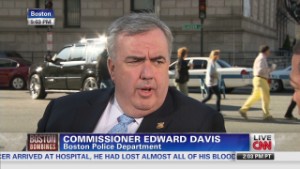

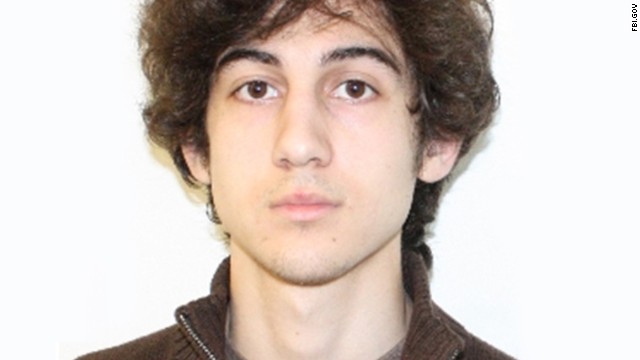
"There was pressure to stick to your ways, your religion, your culture -- to respect that," said Vasquez.
But he saw no seeds of terror.
"He was a big friendly giant. ... There was nothing weird about him, nothing alarming," Vasquez said. "He never went around and tried to force his views on anyone."
Vasquez said he has "very positive memories, very positive interactions."
"The crime doesn't fit the memories."
Clearly, if the allegations against the brothers are true, something changed. Vasquez thinks someone must have "got in his (Tamerlan's) ear and he passed that along probably to whoever he could recruit" -- in this case, he believes, the younger brother.
"In what I've seen of their personalities, the brain behind this is the older brother," Vasquez said. "When it comes to the two of them, he would lead and the little brother followed."
The neighborhood in Cambridge where the family lived at 410 Norfolk is a melting pot of America -- a mix of working-class immigrant families and college intellectuals who attend Harvard and MIT.
It's not unusual for immigrants here to return to their homeland after high school. In fact, it's almost a rite of passage. Residents don't think twice when a neighbor travels to their country of origin.
Yet it is on visits back home in recent years, investigators say, that Tamerlan became radicalized. Shortly after returning from a six-month trip last year, he uploaded several videos to his YouTube account, including one of a well-known jihadist.
Back in 2011, according to the FBI, Russia asked the FBI to interview Tamerlan "based on information that he was a follower of radical Islam and a strong believer, and that he had changed drastically since 2010 as he prepared to leave the United States for travel to the country's region to join unspecified underground groups."
While investigators continue to pore over evidence and documents, those who knew the brothers say their anger over the bombings is compounded by their confusion -- that two nice guys may have taken such a dark turn.
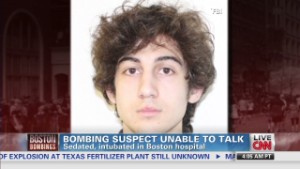
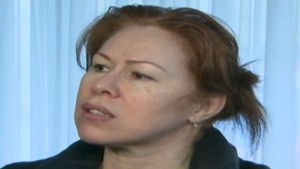
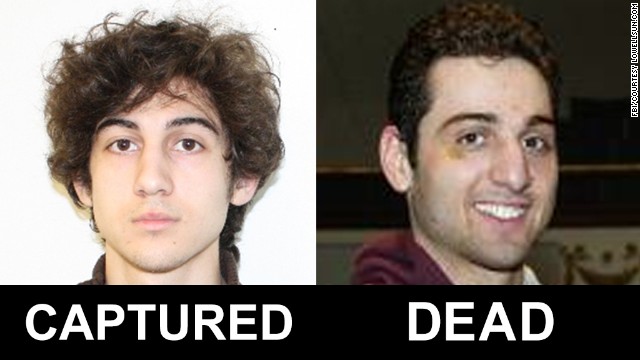
'I teach a guy to fight, not kill'
A couple miles from the family home is the Somerville Boxing Club. Hundreds of boxers have come through the doors over the years. Trainer Gene McCarthy has been there for three decades and remembers the day Tamerlan, then 16, walked in with his father.
The dad was an amateur boxer in Chechnya and wanted his oldest son to get even better training. Tamerlan was a physical specimen: 6-foot-3 and 196 pounds. He had a long reach, great quickness, tenacity and confidence -- the perfect combination of a young Muhammad Ali.
He wouldn't just knock out his opponents; he would annihilate them. "When he threw a punch, he was always right on the money, right on the target," McCarthy said. "Nobody could touch him."
After winning one fight in January 2004, the rising sensation told the Lowell Sun newspaper that he grew up in Grozny, Chechnya, and moved with his family to the United States the year before in hopes of starting a new life.
"I like the USA," Tamerlan said. "America has a lot of jobs. That's something Russia doesn't have. You have a chance to make money here if you are willing to work."
McCarthy ranks him as one of the best fighters he's ever trained. He won the open class heavyweight division for the New England Golden Gloves. The kid could've taken a gold medal at the Olympics, he said, but his immigration status prevented him from trying out for the U.S. Olympic team.
"I would say, 'Geeze, I've got an Olympic champion but he can't qualify,' " McCarthy said. "That was his only downfall -- the fact he wasn't a citizen. ... He had the gumption and everything to win it all. He was fearless."
At the gym, the younger brother, then just 10, would tag along and do calisthenics with Tamerlan. "He was a cute little kid," McCarthy said.
He recalled registering Tamerlan at the Golden Gloves. "While he was waiting in line, he saw a piano and was playing classical music like it was Symphony Hall," McCarthy said. "Everybody in USA Boxing heard it, and they went in there and they were amazed."
Boxers in his gym typically come from troubled backgrounds -- broken families, crime-ridden neighborhoods, absentee fathers. That wasn't the case with Tamerlan who had a solid family support system. His mother, father and younger brother would come to the fights. He went undefeated in his two years with McCarthy.
McCarthy tries to instill self-respect and discipline in his fighters. "That's what boxing means to me," he said. "Train them that, and they can become respectable people -- believe it or not."
His emotions ranged from anger to dismay when he learned the brothers were suspects in the bombings. "I teach a guy how to fight, not kill," he said.
McCarthy sighed. Tamerlan was such a likable person; the only people who didn't like him were the guys he beat to a pulp in the ring.
"He was just a young kid then, and that's about all I can say as far as that goes. I can only say nice things about him."
Tamerlan switched to a different gym after two years. They didn't have a dispute, McCarthy said. It's just the way it goes in the rolling stone life of boxing. The kids come and go.
Yet Tamerlan didn't give up his dream. He registered again with USA Boxing from 2008-2010, but he never regained his undefeated form.
In 2009, his uncle Ruslan Tsarni had a falling out with Tamerlan. "I got into really a state of shock from changes I heard -- I wouldn't say I saw -- I heard from Tamerlan," he told CNN.
The uncle recalled a phone conversation in which Tamerlan called him an "infidel." The young man also told his uncle he was not concerned about work or studies because God had a plan for him.
Soon, Vasquez said, he vanished from his neighborhood. "I wonder what happened in that time we stopped seeing him around."
'I think his brother put him up to it'
If Tamerlan was the reserved one, Dzhokhar -- known as "Jahar" -- was the outgoing kid, always quick with a joke. That was one of his goals, his friends say, to make them laugh. The only time they'd seen him mad was if he lost a wrestling match. Even that was rare. He was an all-star, 135-pound wrestler who placed in the state finals.
One friend remembered seeing how happy Dzhokhar was at the TD Bank Garden arena last year when he became an American citizen. It was an especially patriotic day for those in attendance because the ceremony was held on September 11, 2012, a date that seems tragically odd in retrospect.
"Right now, it's like a big puzzle and we're trying to put pieces together," said one family friend who asked not to be identified.
Dzhokhar was kind-hearted, too. When he wasn't wrestling in high school, he volunteered at an after-school program to help kids with autism and Down syndrome.
"He was a funny comical guy. He had me laughing a lot," said Peter Tenzin, who co-captained the wrestling team with Dzhokhar. "After wrestling practice, he would rather go down and spend time with kids with learning disabilities than relax and go home."
The city awarded Dzhokhar a $2,500 scholarship, and he assimilated well with students at the University of Massachusetts-Dartmouth, where he was studying engineering.
Like so many in the family's neighborhood, Tenzin faults the older brother -- saying he likely brainwashed the friend they knew. "All I can say is I think his brother put him up to it," Tenzin said. "There's no way in heck that he would do it. Mentally, he's just not that kind of guy."
"He loved his brother and looked up to him, and that's why I think (Tamerlan) put him up to this."
Though similar stories are shared around the neighborhood, another picture of Dzhokhar has emerged in the last two days: of a young man who partied on campus after the bombings and allegedly joined his brother in gunning down a cop, carjacking a man in Cambridge, then engaging in a gun battle with Watertown police complete with pipebombs and an explosive device like the ones that wreaked mayhem at the marathon.
Tamerlan died in that shootout. The one person who can provide answers to the bombings is Dzhokhar, who was captured late Friday and remains hospitalized with wounds to the throat.
The latest news -- that police believe the brothers were planning another attack -- can only compound the confusion felt by so many.
"To see two brothers, both carrying leadership traits, flip the switch and jump into something so evil is astonishing," said Luis Vasquez. "It's not what we remember of them."
CNN's Catherine Shoichet contributed to this story.
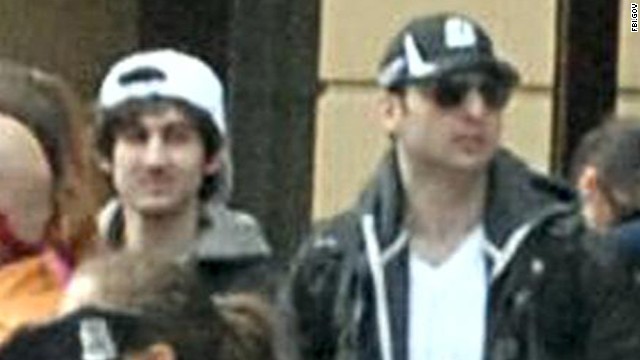
No comments:
Post a Comment